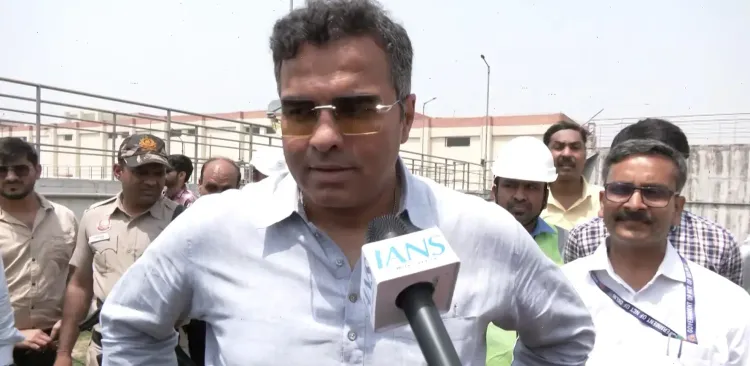Delhi Minister Initiates Action Against Illegal Polluting Units in Yamuna

Synopsis
Key Takeaways
- Delhi's Minister Verma orders action against polluters.
- Collaboration with Haryana to stop untreated water flows.
- Inspection of STPs to ensure operational efficiency.
- Coronation Pillar STP aims for significant carbon reduction.
- Focus on sustainability in sewage treatment practices.
New Delhi, April 20 (NationPress) Taking a firm stance against polluting and illegal industries, Delhi's Minister for Water, Irrigation, and Flood Control, Parvesh Verma, stated on Sunday that the city administration will collaborate closely with Haryana to prevent untreated water from entering the Yamuna River.
During an evaluation of the 318 million litres a day (MLD) Coronation Pillar Sewage Treatment Plant (STP) located in Model Town, Minister Verma mentioned that he is systematically checking all STPs to ensure they operate at full capacity while maintaining the COD (chemical oxygen demand) and BOD (biochemical oxygen demand) levels.
“Our Yamuna will become cleaner if we can manage to capture all untreated water,” he affirmed.
Verma noted, “We observed sewage and industrial waste originating from Haryana. I will request Delhi's Chief Minister to meet with Haryana's Chief Minister, Nayab Singh Saini, along with officials, to ensure they control the waste flowing from their jurisdiction by establishing STPs in their region.”
In his directive against polluting industries, Verma emphasized, “We will take action against unauthorized industries, whether in Delhi or Haryana.”
The COD level, which Verma inspected at the Coronation Pillar STP, indicates the quantity of oxygen necessary to chemically oxidize all oxidizable organic and inorganic substances in a water sample. BOD measures the oxygen consumption by microorganisms while decomposing organic matter in water, effectively quantifying the oxygen needed to break down organic pollutants.
The Coronation Pillar plant, constructed in 2023, is designed to process 318 MLD of sewage daily while reducing annual carbon emissions by approximately 14,450 tonnes.
An official remarked that the project's five-pronged approach reflects its commitment to environmental and social sustainability through sewage treatment, carbon emission reduction, material waste minimization, and biogas power generation. The remaining two aspects focus on manhours and land conservation.
The STP is intended to accommodate a population of 3 million, adhering to the National Green Tribunal's guidelines for sewage treatment and subsequent discharge into the Yamuna. Furthermore, on-site biogas power generation of 70 MW/day has been implemented to lessen the STP's reliance on the power grid.









